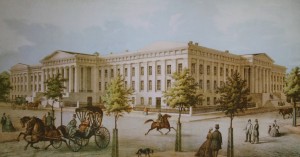by MICHAEL MONTGOMERY
The U.S. patent system has fostered incredible advances in technology and sustained innovation. Changes to that system are invariably controversial, as is the current Patent Reform Act of 2011, now titled the “America Invents Act.” This bill is the fourth successive congressional proposal to make substantive changes to the patent system, and passed in the Senate on March 8, 2011 by an overwhelming 95-5 vote. A corresponding bill with a few changes was introduced in the House of Representatives on March 30, 2011.
Who’s On First? The first major change involves switching from the current system, called “first to invent” which awards a patent to the first inventor, to a system called “first to file” which grants a patent to the first inventor who files a patent application. To attain priority under the proposed law, an inventor will need to file their patent application first, before anyone else files or publicly discloses the subject matter. A one-year exception or “grace period” will apply to the inventor’s own publications, or publications derived from them, within a year prior to the application’s effective filing date. If an inventor is not the first to file their patent application, they may use a new “derivation proceeding” at the U.S. Patent & Trademark Office (USPTO) to argue the first application was derived from their original work.
No, I Was First: A second change allows a person accused of patent infringement to argue they used the invention first, though they didn’t apply for a patent and may not have told anyone. The Senate bill limits this “prior user” defense to business method patents, while the House bill allows it against all patents.
Is That Your Final Answer? The proposed law includes three mechanisms for challenging a patent: either before or after grant of the patent, and with or without the participation of the patentee. The “third-party requested post-grant review” is similar to the current reexamination procedure, challenging the validity of a patent within nine months after it is granted. The House bill changes this time frame to 12 months.
An “inter partes post-grant review” is a contest between the patentee and a challenger that may begin more than nine months after issuance, evaluating novelty and obviousness compared to prior publications. The more controversial measure is called a “pre-issuance third-party submission,” in which anyone can review a published patent application within six months after publication and send the USPTO a prior publication with a description of its relevance. Challengers may be prevented in later lawsuits from requesting re-examination of the patent, or objecting that the patent is invalid.
Read the Label: Products often indicate patent numbers, and lawyers have recently pursued lawsuits alleging that such “patent marking” includes expired or unrelated patents. The bills will end these suits, except if brought by the U.S. government or a competitor who can prove competitive injury.
Do Your Best: Patent applications under the proposed law are still required to describe the “best mode” to accomplish the invention. However, the bills would remove failure to do so from being used to invalidate an issued patent.
Company Patents: Many employers already prepare and file patent applications on behalf of their employees, who often have assigned (or are obligated to assign) inventions to the company. The proposed law makes the process of filing these applications easier.
Phone Home: Within a year, the proposed law mandates reports by the USPTO on the duration of the post-grant reviews, on prior user rights in selected industrialized countries, and by the Small Business Administration on the impact of the first-to-file system on small businesses.
And Many More: Under the bills, tax strategies will not be patentable business methods or inventions, though the House bill excepts tax preparation software. The proposed law would also order the USPTO to prioritize examination for “technologies important to American competitiveness,” such as “green technologies.” The House bill adds several provisions for automatic and discretionary pauses to patent infringement lawsuits. And the bills establish additional USPTO offices outside Washington, D.C.
Follow the Money: The USPTO is the only federal agency that makes a profit, because the fees they take in from inventors and patentees exceed their operating costs. However, for a long time Congress has had a habit of taking some of that money and distributing it to various pet projects. The proposed law would end this practice, creating a USPTO Public Enterprise Fund and giving the USPTO authority to set or adjust its fees to recover the estimated costs of its activities. Inscrutably, the House bill also grants the USPTO “fee setting authority” but continues to state specific fees.
An Elephant Named ‘Backlog’: Arguably the largest problem with the patent system for at least a decade has been the ever-growing backlog of patent applications waiting in the USPTO, a problem described by one official as “deficit examining.” The big question of the America Invents Act is whether it will aid, or impair, efforts to reduce this backlog.
Michael W. Montgomery is a registered patent attorney at the law firm of Christopher & Weisberg, P.A., an intellectual property boutique headquartered in Fort Lauderdale. His practice focuses on building and protecting intellectual property portfolios, litigation and client counseling in intellectual property and technology matters.
copyright Montgomery 2011
